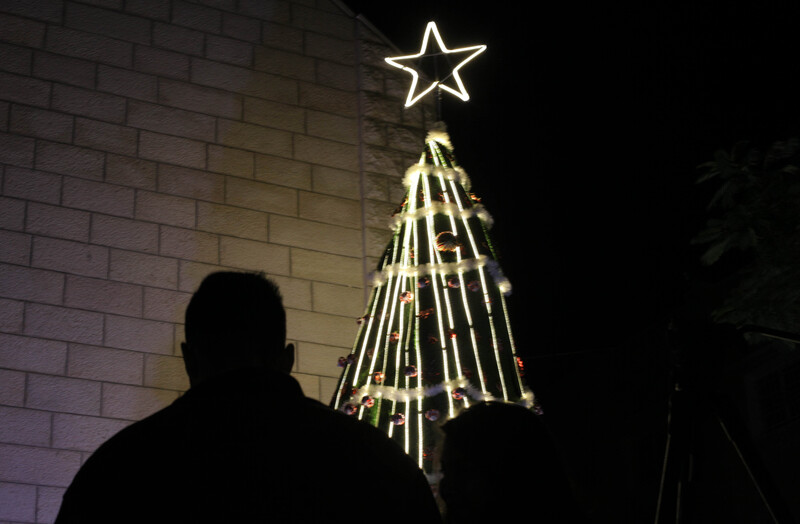Rights and Accountability 16 December 2019

Palestinian Christians attend a tree-lighting ceremony at a church in Gaza City on 14 December.
APA imagesIsrael is blocking Palestinian Christians from Gaza from worshipping in Jerusalem and Bethlehem this Christmas.
COGAT, the bureaucratic arm of Israel’s military occupation, announced on Thursday that it would not give permits to Christians from Gaza to travel to the West Bank for the holiday.
Israel is allowing just 100 Palestinian Christians from Gaza to exit through the Allenby Bridge linking Jordan and the occupied West Bank so long as they travel abroad and are over the age of 45.
“The age limit makes a mockery of the holiday spirit, which is rooted in family,” Israeli human rights group Gisha stated.
The group called Israel’s travel ban for Christians “an extreme violation of the freedom of movement and worship.”
Meanwhile, Jewish and Christian tourists are encouraged to visit from all over the world to celebrate Hanukkah and Christmas, which coincide.
There are approximately 1,000 Palestinian Christians in Gaza, most of whom reportedly requested permits to travel to the West Bank for Christmas.
Gisha wrote to COGAT last month urging the occupation bureaucracy to announce this year’s holiday permit quotas in advance.
The rights group sent a letter to Israel’s defense ministry earlier this month urging it to do the same.
Even though the dates of holidays are fixed, Israel typically announces its permit quotas at the last minute, sometimes even after a holiday begins.
Gisha calls the quotas “small, arbitrary and limited.”
Aida Touma-Sliman, a Palestinian member of Israel’s parliament, had also urged Israeli authorities to “refrain from splitting families by granting certain family members permits and denying others, as it has done in previous years,” Gisha stated.
Israel habitually imposes arbitrary age restrictions on Palestinians during Ramadan and Easter, preventing families from traveling together, or forcing them to spend holidays apart.
Last Easter, Israel reversed its decision to bar Palestinian Christians in Gaza from traveling to the occupied West Bank following international criticism.
Just a few days before the holiday, occupation authorities announced they would let 300 Palestinian Christians out of Gaza to go to the West Bank.
Israel also typically imposes tight closures on all Palestinians in the occupied West Bank and Gaza Strip during major Jewish holidays.
COGAT regularly misrepresents itself as a “humanitarian” agency, rather than as what it really is: an army bureaucracy imposing cruel and arbitrary military rule and collective punishment on millions of occupied people.
In that spirit, COGAT frames the handful of permits it grants as “holiday gestures” given in an act of “goodwill.” In doing so, it violates universal rights to freedom of movement, family life and freedom of worship, according to Gisha.
Earlier this month, COGAT posted a video on Twitter documenting the return of a wooden relic believed to be part of Jesus’ manger to Bethlehem.
The relic was sent to the pope in Rome 1,400 years ago.COGAT said the return marked the beginning of the holiday season in Bethlehem, adding that “Christmas celebrations are considered highly important for the city, both economically and culturally.”
But they are apparently not important enough for Israeli occupation authorities to allow Palestinian Christians from Gaza to attend them.





Comments
Impunity
Permalink Guy replied on
The Israeli government does absolutely anything it wants with total impunity as they know the US has it's back covered and nothing of the sort ,as this article describes , will ever be reported in the main stream media .Even the Christian zionists manage to look the other way and or make excuses so that they don't have to condemn such actions ,in expectation of their second coming . Little do they know that you can't force the hand of God.